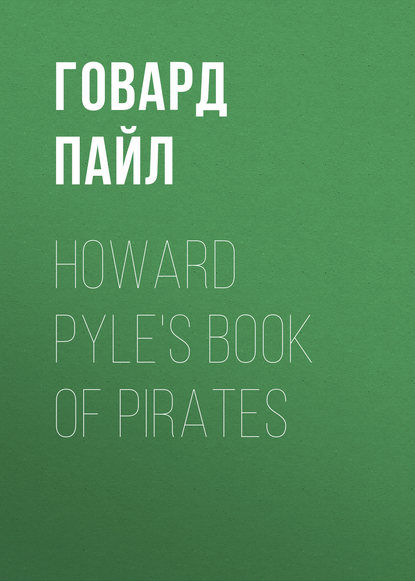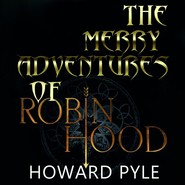По всем вопросам обращайтесь на: info@litportal.ru
(©) 2003-2024.
✖
Howard Pyle's Book of Pirates
Настройки чтения
Размер шрифта
Высота строк
Поля
He did not know that he was destined to stay there as long as he should live.
"And now," said Mr. Chillingsworth, "tell me about yourself."
"I have nothing to tell, Your Honor," said Tom, "except that I was washed up out of the sea."
"Washed up out of the sea!" exclaimed Mr. Chillingsworth. "Why, how was that? Come, begin at the beginning, and tell me all."
Thereupon Tom Chist did as he was bidden, beginning at the very beginning and telling everything just as Molly Abrahamson had often told it to him. As he continued, Mr. Chillingsworth's interest changed into an appearance of stronger and stronger excitement. Suddenly he jumped up out of his chair and began to walk up and down the room.
"Stop! stop!" he cried out at last, in the midst of something Tom was saying. "Stop! stop! Tell me; do you know the name of the vessel that was wrecked, and from which you were washed ashore?"
"I've heard it said," said Tom Chist, "'twas the Bristol Merchant."
"I knew it! I knew it!" exclaimed the great man, in a loud voice, flinging his hands up into the air. "I felt it was so the moment you began the story. But tell me this, was there nothing found with you with a mark or a name upon it?"
"There was a kerchief," said Tom, "marked with a T and a C."
"Theodosia Chillingsworth!" cried out the merchant. "I knew it! I knew it! Heavens! to think of anything so wonderful happening as this! Boy! boy! dost thou know who thou art? Thou art my own brother's son. His name was Oliver Chillingsworth, and he was my partner in business, and thou art his son." Then he ran out into the entryway, shouting and calling for his wife and daughter to come.
So Tom Chist – or Thomas Chillingsworth, as he now was to be called – did stay to supper, after all.
This is the story, and I hope you may like it. For Tom Chist became rich and great, as was to be supposed, and he married his pretty cousin Theodosia (who had been named for his own mother, drowned in the Bristol Merchant).
He did not forget his friends, but had Parson Jones brought to New York to live.
As to Molly and Matt Abrahamson, they both enjoyed a pension of ten pounds a year for as long as they lived; for now that all was well with him, Tom bore no grudge against the old fisherman for all the drubbings he had suffered.
The treasure box was brought on to New York, and if Tom Chist did not get all the money there was in it (as Parson Jones had opined he would) he got at least a good big lump of it.
And it is my belief that those log books did more to get Captain Kidd arrested in Boston town and hanged in London than anything else that was brought up against him.
Chapter V
JACK BALLISTER'S FORTUNES
I
We, of these times, protected as we are by the laws and by the number of people about us, can hardly comprehend such a life as that of the American colonies in the early part of the eighteenth century, when it was possible for a pirate like Capt. Teach, known as Blackbeard, to exist, and for the governor and the secretary of the province in which he lived perhaps to share his plunder, and to shelter and to protect him against the law.
At that time the American colonists were in general a rough, rugged people, knowing nothing of the finer things of life. They lived mostly in little settlements, separated by long distances from one another, so that they could neither make nor enforce laws to protect themselves. Each man or little group of men had to depend upon his or their own strength to keep what belonged to them, and to prevent fierce men or groups of men from seizing what did not belong to them.
It is the natural disposition of everyone to get all that he can. Little children, for instance, always try to take away from others that which they want, and to keep it for their own. It is only by constant teaching that they learn that they must not do so; that they must not take by force what does not belong to them. So it is only by teaching and training that people learn to be honest and not to take what is not theirs. When this teaching is not sufficient to make a man learn to be honest, or when there is something in the man's nature that makes him not able to learn, then he only lacks the opportunity to seize upon the things he wants, just as he would do if he were a little child.
In the colonies at that time, as was just said, men were too few and scattered to protect themselves against those who had made up their minds to take by force that which they wanted, and so it was that men lived an unrestrained and lawless life, such as we of these times of better government can hardly comprehend.
The usual means of commerce between province and province was by water in coasting vessels. These coasting vessels were so defenseless, and the different colonial governments were so ill able to protect them, that those who chose to rob them could do it almost without danger to themselves.
So it was that all the western world was, in those days, infested with armed bands of cruising freebooters or pirates, who used to stop merchant vessels and take from them what they chose.
Each province in those days was ruled over by a royal governor appointed by the king. Each governor, at one time, was free to do almost as he pleased in his own province. He was accountable only to the king and his government, and England was so distant that he was really responsible almost to nobody but himself.
The governors were naturally just as desirous to get rich quickly, just as desirous of getting all that they could for themselves, as was anybody else – only they had been taught and had been able to learn that it was not right to be an actual pirate or robber. They wanted to be rich easily and quickly, but the desire was not strong enough to lead them to dishonor themselves in their own opinion and in the opinion of others by gratifying their selfishness. They would even have stopped the pirates from doing what they did if they could, but their provincial governments were too weak to prevent the freebooters from robbing merchant vessels, or to punish them when they came ashore. The provinces had no navies, and they really had no armies; neither were there enough people living within the community to enforce the laws against those stronger and fiercer men who were not honest.
After the things the pirates seized from merchant vessels were once stolen they were altogether lost. Almost never did any owner apply for them, for it would be useless to do so. The stolen goods and merchandise lay in the storehouses of the pirates, seemingly without any owner excepting the pirates themselves.
The governors and the secretaries of the colonies would not dishonor themselves by pirating upon merchant vessels, but it did not seem so wicked after the goods were stolen – and so altogether lost – to take a part of that which seemed to have no owner.
A child is taught that it is a very wicked thing to take, for instance, by force, a lump of sugar from another child; but when a wicked child has seized the sugar from another and taken it around the corner, and that other child from whom he has seized it has gone home crying, it does not seem so wicked for the third child to take a bite of the sugar when it is offered to him, even if he thinks it has been taken from some one else.
It was just so, no doubt, that it did not seem so wicked to Governor Eden and Secretary Knight of North Carolina, or to Governor Fletcher of New York, or to other colonial governors, to take a part of the booty that the pirates, such as Blackbeard, had stolen. It did not even seem very wicked to compel such pirates to give up a part of what was not theirs, and which seemed to have no owner.
In Governor Eden's time, however, the colonies had begun to be more thickly peopled, and the laws had gradually become stronger and stronger to protect men in the possession of what was theirs. Governor Eden was the last of the colonial governors who had dealings with the pirates, and Blackbeard was almost the last of the pirates who, with his banded men, was savage and powerful enough to come and go as he chose among the people whom he plundered.
Virginia, at that time, was the greatest and the richest of all the American colonies, and upon the farther side of North Carolina was the province of South Carolina, also strong and rich. It was these two colonies that suffered the most from Blackbeard, and it began to be that the honest men that lived in them could endure no longer to be plundered.
The merchants and traders and others who suffered cried out loudly for protection, so loudly that the governors of these provinces could not help hearing them.
Governor Eden was petitioned to act against the pirates, but he would do nothing, for he felt very friendly toward Blackbeard – just as a child who has had a taste of the stolen sugar feels friendly toward the child who gives it to him.
At last, when Blackbeard sailed up into the very heart of Virginia, and seized upon and carried away the daughter of that colony's foremost people, the governor of Virginia, finding that the governor of North Carolina would do nothing to punish the outrage, took the matter into his own hands and issued a proclamation offering a reward of one hundred pounds for Blackbeard, alive or dead, and different sums for the other pirates who were his followers.
Governor Spottiswood had the right to issue the proclamation, but he had no right to commission Lieutenant Maynard, as he did, to take down an armed force into the neighboring province and to attack the pirates in the waters of the North Carolina sounds. It was all a part of the rude and lawless condition of the colonies at the time that such a thing could have been done.
The governor's proclamation against the pirates was issued upon the eleventh day of November. It was read in the churches the Sunday following and was posted upon the doors of all the government custom offices in lower Virginia. Lieutenant Maynard, in the boats that Colonel Parker had already fitted out to go against the pirates, set sail upon the seventeenth of the month for Ocracoke. Five days later the battle was fought.
Blackbeard's sloop was lying inside of Ocracoke Inlet among the shoals and sand bars when he first heard of Governor Spottiswood's proclamation.
There had been a storm, and a good many vessels had run into the inlet for shelter. Blackbeard knew nearly all of the captains of these vessels, and it was from them that he first heard of the proclamation.
He had gone aboard one of the vessels – a coaster from Boston. The wind was still blowing pretty hard from the southeast. There were maybe a dozen vessels lying within the inlet at that time, and the captain of one of them was paying the Boston skipper a visit when Blackbeard came aboard. The two captains had been talking together. They instantly ceased when the pirate came down into the cabin, but he had heard enough of their conversation to catch its drift. "Why d'ye stop?" he said. "I heard what you said. Well, what then? D'ye think I mind it at all? Spottiswood is going to send his bullies down here after me. That's what you were saying. Well, what then? You don't think I'm afraid of his bullies, do you?"
"Why, no, Captain, I didn't say you was afraid," said the visiting captain.
"And what right has he got to send down here against me in North Carolina, I should like to ask you?"
"He's got none at all," said the Boston captain, soothingly. "Won't you take a taste of Hollands, Captain?"
"He's no more right to come blustering down here into Governor Eden's province than I have to come aboard of your schooner here, Tom Burley, and to carry off two or three kegs of this prime Hollands for my own drinking."
Captain Burley – the Boston man – laughed a loud, forced laugh. "Why, Captain," he said, "as for two or three kegs of Hollands, you won't find that aboard. But if you'd like to have a keg of it for your own drinking, I'll send it to you and be glad enough to do so for old acquaintance' sake."
"But I tell you what 'tis, Captain," said the visiting skipper to Blackbeard, "they're determined and set against you this time. I tell you, Captain, Governor Spottiswood hath issued a hot proclamation against you, and 't hath been read out in all the churches. I myself saw it posted in Yorktown upon the customhouse door and read it there myself. The governor offers one hundred pounds for you, and fifty pounds for your officers, and twenty pounds each for your men."
"Well, then," said Blackbeard, holding up his glass, "here, I wish 'em good luck, and when they get their hundred pounds for me they'll be in a poor way to spend it. As for the Hollands," said he, turning to Captain Burley, "I know what you've got aboard here and what you haven't. D'ye suppose ye can blind me? Very well, you send over two kegs, and I'll let you go without search." The two captains were very silent. "As for that Lieutenant Maynard you're all talking about," said Blackbeard, "why, I know him very well. He was the one who was so busy with the pirates down Madagascar way. I believe you'd all like to see him blow me out of the water, but he can't do it. There's nobody in His Majesty's service I'd rather meet than Lieutenant Maynard. I'd teach him pretty briskly that North Carolina isn't Madagascar."
On the evening of the twenty-second the two vessels under command of Lieutenant Maynard came into the mouth of Ocracoke Inlet and there dropped anchor. Meantime the weather had cleared, and all the vessels but one had gone from the inlet. The one vessel that remained was a New Yorker. It had been there over a night and a day, and the captain and Blackbeard had become very good friends.
The same night that Maynard came into the inlet a wedding was held on the shore. A number of men and women came up the beach in oxcarts and sledges; others had come in boats from more distant points and across the water.












